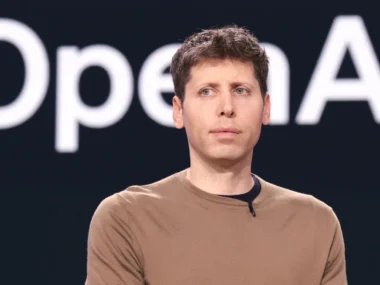The UK Competition Commission will investigate Microsoft and OpenAI’s collaboration.
Why is the UK’s Competition & Markets Authority interfering in the amusing and vital – but remote – drama at San Francisco-based OpenAI? Even if the CMA later discovers that Microsoft, another US corporation, is pulling the strings at Sam Altman’s show, what can it do? Doesn’t this all represent the UK as an inhospitable destination for tech investment, despite Rishi Sunak’s enthusiasm to organize AI summits and have intimate conversations with Elon Musk?
All valid questions, and the CMA should brace itself for more of the same. It is strange that the UK regulator is the first to wonder, albeit in a preliminary fashion, if Microsoft has obtained effective control over OpenAI and, if so, whether this poses a concern. But there is another way to look at the situation: thank god a regulator somewhere is looking into what happened at OpenAI.
The company is definitely the market leader in an artificial intelligence market that will be massive. If the present Big Tech group has the whole thing figured out before the game has even begun, it is certainly fair area for regulatory investigation. When the leading social media corporations built fortresses around their operations and then acquired every upstart that seemed remotely worrisome, global watchdogs were asleep at the wheel. It’s best not to make the same mistake twice.
And, in fact, the CMA is probably not going out on a limb here. The Federal Trade Commission in the United States was concerned this summer that AI businesses’ “open first, close later” strategies – which may have occurred at OpenAI – could “undermine long-term competition.” It’s also worth noting that German officials looked into Microsoft’s influence over OpenAI this year and said they’d investigate again if it grew.
Altman was fired by the controlling non-profit board of OpenAI last month, only to be rehired within days. The governance structures under a new and expanded board appear to be critical to OpenAI’s actual independence from Microsoft, which had previously invested $13 billion (about £10.3 billion) in OpenAI’s profit-seeking arm.
“The only thing that has changed is that Microsoft will now have a non-voting observer on OpenAI’s board, which is very different from an acquisition such as Google’s purchase of DeepMind in the UK [in 2014],” said Brad Smith, Microsoft vice-chair and president, on Friday.
Maybe, but that wasn’t exactly what Microsoft’s own CEO, Satya Nadella, was saying during the height of the crisis. “There is no OpenAI without, sort of, Microsoft leaning in, in a deep way, to partner with this company on their mission,” he stated a few weeks ago, highlighting his company’s processing and cloud capabilities.
At this point, the CMA’s action is insignificant. The watchdog is only looking for feedback on whether “recent developments” have resulted in “a relevant merger” situation. It has the right to do so since the key issue is the two companies’ turnover in the UK, not where they are from.
This is fair game because OpenAI’s ChatGPT product is already enormous globally, and Microsoft is definitely big in the UK. Yes, remedies would be another story – and it’s difficult to see what could be accomplished without the participation of US colleagues. But be thankful that the CMA is awake. The primary concern is the safety of AI products, which is not the topic at hand. However, competition is also important.











